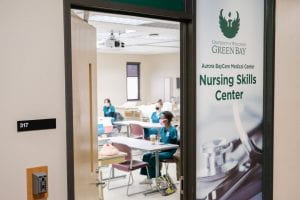2020 was a memorable year. And it was significant to nursing:
- 2020 marked 200 years since the birth of Florence Nightingale, the caring nurse and leader credited with professionalizing nursing.
- 2020 was declared the International Year of the Nurse and Midwife by the World Health Organization, recognizing nurses’ courage and commitment during the COVID-19 pandemic.
2020 marked UW-Green Bay’s first cohort of nurses in the traditional Bachelor of Science in Nursing (BSN) degree program.
The pandemic didn’t cause 19-year-old Beyonce Moua to shy away from the field.
“If anything, the pandemic has made me appreciate nurses even more than I previously did,” says Moua. “These nurses are knowledgeable, compassionate and driven individuals who continue to impress me by working hard through the virus. I am happy that the rest of the world now also recognizes the great work that health care professionals provide.”
Nurses are playing a crucial role in this pandemic, says Heather Schroeder, Vice President of Nursing and Chief Nurse Officer for Aurora BayCare Medical Center in Green Bay.
“The pandemic has touched every level in nursing. Nurses are at the front and center contributing their expertise in advancing the health and welfare of people.”
Moua’s drive to become a nurse started at home in Appleton. “Watching my dad suffer through his two major (heart) surgeries, I would like to be a nurse helping those in similar situations to my father,” she says.

Moua’s pride in the profession underscores the importance and critical need for
a sustained nursing workforce. It is estimated the shortage of registered nurses
in Wisconsin will increase to nearly 20,000 by 2035, representing a 35 percent shortfall.
Each year, UW-Green Bay’s traditional BSN program will accept 48 new students who will learn through an innovative concept-based nursing curriculum and in state-of-the-art facilities at the new Aurora BayCare Nursing Skills Center on the Green Bay Campus.
The Aurora BayCare Nursing Skills Center serves as a hub for hands-on practice, simulation of clinical events using hi-tech patient mannequins and open lab student practice time.
“A BSN credential contributes to improved patient outcomes because it focuses further on aspects of research, evidenced-based practice, leadership development as well as provides more job opportunities for the nurse,” says Schroeder.
UW-Green Bay’s partnership with Aurora BayCare ensures nursing students are prepared to deliver high-quality, safe patient care as they prepare for careers in nursing.
Renovated space on the third floor of Wood Hall includes:
- Skills lab/classroom with hospital beds and medium- and low fidelity mannequins for simulation learning; teaching and practice area with equipment for practice such as blood drawing, IV insertion, catheter placement, oxygen management
- Classroom with a medium fidelity mannequin for group simulation learning and observation
- Cloud Family Digital Learning Center serves nursing students in preparation for state testing.
- UW-Green Bay students will learn even more clinical skills at Aurora BayCare Medical Center’s new simulation unit in Green Bay using high-fidelity mannequins.

Nursing students at UW-Green Bay were enlisted to help rollout the state’s COVID-19 vaccination effort at 13 sites in Northeast Wisconsin. With the leadership of Professor Chris Vandenhouten and nursing faculty, nursing students have provided more than 700 hours vaccinating and educating at COVID vaccination sites in February and March alone. Additionally, nursing faculty have contributed 77 hours toward vaccination efforts during this period. Students were eligible for academic credit for their participation, as well as real-world experience.
- The UW System offered $500 tuition credits to nursing students who provided 16 hours of work in vaccine and rapid testing clinics at the state’s 13 universities, allowing an opportunity for the more than 4,000 nursing students statewide to receive real-world experience during a time when traditional clinical experiences were limited because of the virus.
- UW-Green Bay hosted one of the state’s COVID-19 surge-testing sites—a partnership between the UW System’s 13 universities and the U.S. Department of Health and Human Services.
- Prevea Health partnered with UW-Green Bay to launch four community COVID-19 vaccine clinics at its campuses in Green Bay, Manitowoc, Marinette and Sheboygan. As of mid-May, more than 105,000 vaccinations had been administered at the University campuses.
Story contributed by Joy Wick, Executive Director of Advancement
